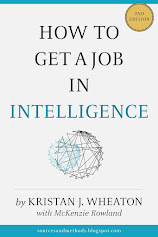Part 1 -- The Problem Of "Intelligence"
Part 2 -- The Importance Of A Clear Definition Of Intelligence
Part 3 -- The Reasons For A Lack Of A Definition
Part 4 -- What Would A Good Definition Look Like?
Part 5 -- Previous Attempts To Define Intelligence/Legislative Attempts
Part 6 -- Previous Attempts To Define Intelligence/Agency Attempts
Part 7 -- Previous Attempts To Define Intelligence/Expert Attempts
Part 8 -- Previous Attempts To Define Intelligence/Law Enforcement And Private Sector Attempts
There seems to be three possibilities at this point. The first is that intelligence doesn’t really exist; that what people call intelligence is better described with one or more other nouns but, due to sloppy thinking, these concepts get lumped, without real reason, under the rubric of “intelligence.” There is scant evidence for this line of thinking. Intelligence certainly exists in the minds of the people who practice it and the decisionmakers who pay for it. As an historical reality, as an industry, as an academic discipline, as a career field, intelligence is growing and thriving. To make the claim that it does not exist is to fly in the face of all of these facts.
A second line of thinking (one with more weight behind it) is that intelligence really is “secret state activity” and nothing more. The law enforcement, private sector and other communities have appropriated the word “intelligence” to describe their activities without real cause. Perhaps they have done it for marketing purposes – to make their activity seem more “sexy”. Perhaps they have done it to acquire resources from Congress (Since the terrorist attacks on the World Trade Center Towers and the Pentagon on September 11, 2001, the intelligence budget in the US alone has almost doubled). Whatever the reason, it is not intelligence to these authors because it is not done by the spies and analysts within the national security communities of the world.
This, too, seems to be faulty logic. While notions of secrecy are often linked to intelligence activity, it is clearly, based on the earlier discussion, not a requirement. Likewise, activities in other fields such as business and law enforcement, often, for all practical purposes, mirror activities in the national security arena (Comment: It is worth noting here, perhaps, that the US national security intelligence community actually contains three law enforcement organizations, the FBI, the Drug Enforcement Agency and the Department Of Homeland Security as well as one primarily business focused agency, The Department of the Treasury). There is no real reason not to acknowledge the similarities. Anything else comes across as arbitrary.
The only option left is to admit that there is a common core of intelligence and intelligence-like activities that cut across disciplines; that there is a general notion of intelligence that defines what is intelligence, what isn’t intelligence and what exists at the margins – a “big tent” definition of intelligence.
What might such a definition look like? The first place to look is in the common features of the various definitions of intelligence. Next, it makes sense to compare the features identified by this analysis to traditional intelligence activities to see if these practical, day-to-day intelligence tasks meet the criteria established in the theoretical analysis. Finally, we should look at activities that are not traditionally considered intelligence and activities that are arguably at the margins of the definition in order to finalize a working definition of intelligence.
Where to begin? Clearly, intelligence is a process and virtually all previous definitions of intelligence recognize that either implicitly or explicitly. It is something that happens, not something that simply is. Many of the previous definitions of intelligence have gone as far as to outline this process, including such activities as collection, analysis and dissemination within the definition itself. Others have highlighted the final product (which is just as much a part of the "process" as any other component activity). What is interesting is that the actual issue of process is an open theoretical question within the intelligence community. Academics and practitioners have proposed several models over the years but none of them has yet captured the full scope of activities and experience of real world intelligence work.
The fact that the process of intelligence is still subject to academic debate does not mean that there are not common functions embedded in each instance of intelligence activity. Just as there are common features to each act of engineering or architecture no matter how trivial or how significant, there are many common features, and wide agreement, on much of what makes up the intelligence process. What is still missing is a complete, empirically based description of this process.
The previous discussions and definitions also make it clear that intelligence is a decision support function – it is for a decisionmaker. From earliest times, leaders have funded intelligence operations in order to have the information and analysis that they needed to make better decisions. Today, this decisionmaker can be the President of the United States, a Chief Executive Officer (CEO) of a Fortune 500 company or you, trying to decide what kind of car to buy. Intelligence that is not decisionmaker focused is, like a self-licking ice-cream cone, designed only to satisfy itself.
Embedded in the concept that intelligence is for a decisionmaker are also whatever notions of secrecy the definition of intelligence might contain. If secrecy is part of the definition then its only legitimate purpose is to preserve current or future options for the decisionmaker. In fact, given the problems that business and law enforcement have with traditional ideas of “secret” intelligence, it is probably better to include here the concept of “confidentiality” as the more inclusive term, of which secrecy is merely a subset. In other words, confidentiality is a term that travels well between each of the disciplines (and even outside the three discipline structure that makes up the bulk of the topics discussed in this series of posts); secrecy only works well with one.
Less clear is the purpose of intelligence. What does intelligence actually do for the decisionmaker? Sun Tzu’s answer to that question was “foreknowledge” while others claim that the purpose is merely to “provide context”. Some break the purpose down into a number of discrete activities such as describe, explain and predict. Others draw even finer distinctions between making predictions and forecasting and estimating. Robert M. Clark, in his book Intelligence Analysis: A Target Centric Approach provides a simple catch-all for all of these activities. Intelligence, he claims is designed to reduce the level of uncertainty for the decisionmaker. In its simplest form, then, answering factual questions helps reduce a decisionmaker’s level of uncertainty. For example, a chief of police might want to know the approximate size of a particular gang, a CEO might want to know basic facts and figures about the size and profitability of one of his competitors or a politician might want to know the biography of a new president of an allied country. Providing these answers clearly helps reduce uncertainty and, in some sense, helps to inform the decisionmaking process.
On other hand, this type of descriptive information is becoming easier and easier to find and decisionmakers are becoming less willing to fund intelligence organizations that simply “know stuff”. Increasingly, the emphasis is for intelligence organizations to provide estimates of what the future holds, to predict the future actions of the gang, the competitor or the new foreign president. It is these insights into the future that makes intelligence worth the money spent on it because it is these insights into the future that allows decisionmakers to allocate resources today to take advantage of opportunities or to mitigate threats before they become realities. While finding, collecting and verifying information are undoubtedly part of the intelligence process, they are mostly necessary pre-conditions for the more in-demand tasks involving the generation of estimates and forecasts.
These three descriptors of intelligence – that it is a process, designed to reduce the level of uncertainty and that it is for a decisionmaker – taken as a whole actually describe any number of decision support activities. A human resources director who sorts through employee performance reports and makes recommendations to his or her boss regarding who the company should promote is doing work that, so far, is identical to intelligence work. Likewise, an operations officer who examines the readiness reports from a military organization’s subordinate units or a police sergeant who informs the chief who passed and who failed marksmanship training both meet these three basic criteria
There are two additional criteria which help distinguish intelligence activity from other decision support activities, however. The first is that intelligence is focused externally – it is fundamentally about “them”, not about “us”. Intelligence is always concerned with the other guy. Since earliest times, spies, envoys and other agents have been sent out by kings and businesspeople to find out what other kings and businesspeople were doing. Today, the “they” in this definition can be criminals for law enforcement professionals, competitors for businesses and other nations or transnational groups for the national security community.
This external focus does not mean that intelligence professionals do not need to know anything about the internal workings of the organization they support. Quite the contrary, intelligence professionals have an obligation to understand the organization they support if only to better understand what is relevant and what is less relevant or even irrelevant to their decisionmakers. For example, an investigative unit examining a drug gang would be very interested in information regarding the gang’s suppliers and routes but would be considerably less interested in the gang members’ individual grocery lists. A local supermarket, on the other hand, might be more interested in the grocery lists than in the drug routes. While this example is a bit fanciful, it makes the point. What you see and what you want to know depends on where you stand. Intelligence professionals must not only intimately understand the environment in which their organization is operating, they must understand enough about their own organization’s capabilities, limitations and plans to know what information and which estimates are most important to that organization.
The final aspect of the definition of intelligence deals with the kinds of information intelligence units typically use. First, intelligence actively collects and uses information from all sources. For many people unfamiliar with the history of intelligence, this only makes sense. Assuming the sources were reasonably reliable, why would you exclude them from your analysis? This is exactly what has happened in the past, however. Even today, there is still a debate in some circles about the role of open source information in intelligence analysis. Despite this, for most people and virtually all intelligence professionals, distinguishing information based on its source (rather than it s relevance to the questions at hand) and using some of it but not other bits, makes no sense.
Most other professions do not habitually use information from all sources. The word “habitually” was carefully chosen. There are clearly exceptions in all cases. There are times when an intelligence inquiry is narrowly focused on a single source or type of source. Likewise, there are times when other professions use a broad range of sources. Even those that theoretically use information from all sources often do not do so in practice, however. For example, an engineer, whose firm had been recently contracted to build a bridge, would be far more likely to collect information regarding the various kinds and cost of steel than he or she would be to collect information on the psychological motivations for building the bridge. Intelligence professionals, interested in the construction of the exact same bridge, would likely collect all types of information available about the bridge. Such an approach is necessary in intelligence because not all information is available all of the time and the intelligence professional never knows when two or more pieces of information might come together in a unique and insightful way. While admittedly a criterion that is somewhat fuzzy around the edges, the omnivorous nature of information collection in intelligence tends to distinguish it from other activities.
Second, and more important for the definition of intelligence, is the kind of “all-source” information that intelligence traditionally uses. Intelligence tends to specialize in collecting and analyzing “unstructured” information. What is unstructured information? It is easiest to understand, perhaps, in contrast to its opposite, structured information. Structured information is information that is both generally reliable and has an underlying order to it. Temperature readings taken at the same location at the same time each day for a year is an example of a set of structured data. Rows of daily, weekly and monthly sales information in a spreadsheet or crime reports sorted geographically are both examples of structured data sets. Structured data is very useful because analysts can manipulate and analyze this data in a number of very practical and powerful ways. Sophisticated geographical analyses and statistical manipulation work well with structured data and typically yield valuable insights.
Unstructured data is the exact opposite. In its worst case, it is unreliable or even deliberately deceptive information. It may include data in many different formats or languages. The exact same thing may be said or written in many different ways. Rumors, fuzzy photographs and hearsay are all (or mostly) unstructured data. Some data is so unstructured as to be meaningless. So important is this idea of structure to the analysis of data that an entire science has been built around removing the structure from data in order to protect it – encryption. The best encryption algorithms essentially attempt to remove any traces of structure from a data set, to make it seem like a random stream of data. Cryptanalysts, on the other hand, spend their lives trying to find the underlying pattern in the data set in order to make it meaningful once again.
While all professions acknowledge the “garbage in, garbage out” principle that recognizes that data must be reliable in order for analysts to be able to work with it, most professions use methods that assume that the information is reliable. Intelligence professionals assume the exact opposite. Intelligence analysis methods assume that at least some of the data is untrue or even deliberately deceptive. The best of these methods actually help the analyst identify false and misleading information (Note: This is not to say that intelligence never uses structured data. Certainly, if available, such data tends to lead to more accurate forecasts, at least within the usually narrow confines of such a data set. It is also important to distinguish here structured methods, which are often used by intelligence analysts, from the unstructured data these methods typically use. The point here is that intelligence professionals are, to a greater degree than other professions, unstructured data specialists).
The vast majority of the data we encounter on a day-to-day basis, however, is not very well structured. Despite the best efforts of technologists and gadgeteers, most of the information, from personal conversations and body language to blogs, videos, Really Simple Syndication (RSS) feeds, and other as yet undeveloped new technologies, that surrounds us every day is largely unstructured and likely to remain that way for some time. The ability of intelligence to deal with this vast body of unstructured data is an important distinction that sets intelligence apart from other, otherwise similar, professions.
As the discussion up to this point has shown, the definition of intelligence is a contentious issue within the intelligence communities. The academic study of intelligence and the relatively new discipline of “intelligence studies” in particular, combined with a proliferation of information resources brought on by the technological advances of the last 50 years are forcing these communities to come to grips with this basic lack of theoretical structure. Some question the need for a definition of intelligence, considering it self-evident, others disagree strongly with the idea of intelligence as a separate process while still others fall somewhere in between or even outside this spectrum.
Still, a definition is a basic concept. While acknowledging the controversy, I believe that it is imperative that professionals have an operational definition of intelligence; one that distinguishes intelligence from other activities while also giving practitioners some insight into the unique body of knowledge and set of skills that is their profession. With all these things in mind, I suggest, then, that:
- Intelligence is a process, using primarily unstructured information from all sources and focused externally, that is designed to reduce the level of uncertainty for a decisionmaker.




